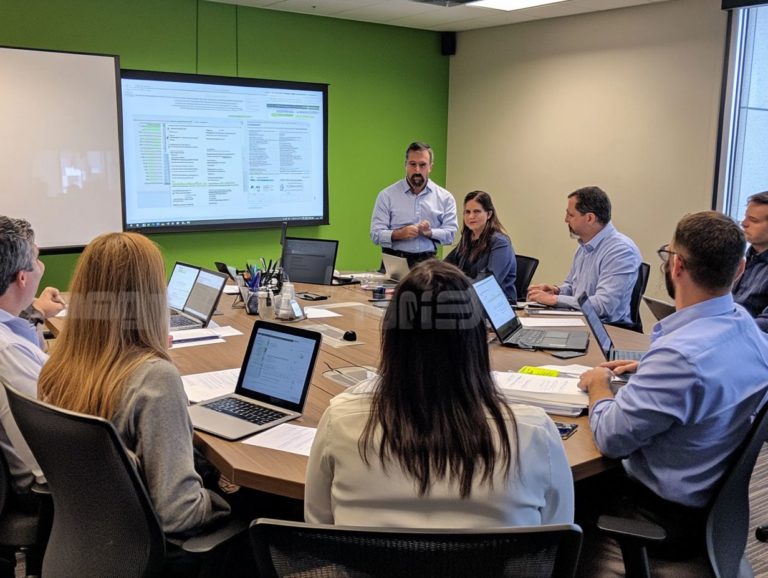“Building a Culture of Continuous Learning in CRM”
In today’s fast-paced business landscape, the importance of continuous learning within Customer Relationship Management (CRM) cannot be overstated.
This article delves into the numerous advantages for both businesses and employees. It illustrates how a commitment to ongoing education can elevate customer interactions and stimulate growth.
You ll discover the common obstacles that impede the development of a learning culture, along with actionable strategies for effective implementation.
It’s essential to know how to measure success and maintain engagement, ensuring that your CRM practices evolve in tandem with your team.
Join us as we explore the essential components of nurturing a dynamic learning environment in CRM.
Contents
- Key Takeaways:
- The Importance of Continuous Learning in CRM
- Barriers to Building a Culture of Continuous Learning
- Strategies for Implementing Continuous Learning in CRM
- Measuring the Success of a Continuous Learning Culture
- Tips for Sustaining Continuous Learning in CRM
- Frequently Asked Questions
- Q1: What is the importance of building a culture of continuous learning in CRM?
- Q2: How can organizations build a culture of continuous learning in CRM?
- Q3: What are the benefits of a culture of continuous learning in CRM?
- Q4: How can managers and leaders promote a culture of continuous learning in CRM?
- Q5: What role does technology play in building a culture of continuous learning in CRM?
- Q6: How can a culture of continuous learning in CRM contribute to the overall success of an organization?
Key Takeaways:

Act now! Continuous learning in CRM is key for both businesses and employees, leading to improved performance and growth.
Identifying and overcoming barriers, such as resistance to change, is crucial in building a culture of continuous learning in CRM.
To successfully implement continuous learning in CRM, creating a learning plan and utilizing technology and resources are key strategies.
The Importance of Continuous Learning in CRM
Embracing continuous learning in Customer Relationship Management (CRM) is vital for creating a workplace that values employee development and enriches organizational knowledge.
In today s fast-paced business landscape, where performance enhancement and digital transformation take center stage, adopting continuous learning methodologies equips you with the essential skills necessary to adapt to changes.
This proactive approach not only drives workplace learning initiatives but also ensures your ability to excel in response to evolving customer expectations.
By committing to improving your skills and innovative practices, you play a significant role in fostering your organization s long-term success and resilience.
Benefits for Businesses and Employees
The benefits of continuous learning in CRM are substantial, influencing both your business and employees by boosting engagement and promoting professional growth.
This approach cultivates an environment where innovative ideas can flourish. It significantly enhances employee retention rates.
When individuals recognize clear pathways for career advancement and the chance to sharpen their skills through targeted training, they re far more inclined to stay committed to your organization.
By conducting a thorough skills gap analysis, you can pinpoint areas where employees may need additional development. This ensures your organization meets performance metrics effectively.
Ultimately, this fosters a more skilled workforce, which is crucial for driving your organizational success and achieving long-term goals.
Barriers to Building a Culture of Continuous Learning
Fostering a culture of continuous learning within an organization frequently faces a variety of obstacles. These include challenges related to organizational learning processes, insufficient trust, and transparency among employees.
Identifying and Overcoming Challenges
Identifying and overcoming challenges in continuous learning requires you to adopt a strategic approach aimed at enhancing employee motivation, facilitating knowledge sharing, and implementing effective programs where experienced employees guide newer ones.
Fostering collaboration skills among your employees is crucial for creating an environment where continuous learning can truly flourish. By leveraging various leadership training techniques, you can cultivate a culture of trust and open communication.
Encouraging team-building exercises will help break down barriers, enabling your employees to share insights and experiences. This, in turn, enriches the collective knowledge base.
Integrating community-building initiatives, such as regular workshops and peer learning sessions, will help create a supportive atmosphere that not only encourages your employees to seek help but also gives them the power to mentor others.
This reinforces their own learning and professional growth, creating a win-win situation for everyone involved.
In summary, committing to continuous learning in CRM is not just beneficial but essential for fostering a thriving workplace.
Start enhancing your CRM skills today for a more successful tomorrow!
Strategies for Implementing Continuous Learning in CRM

Implementing continuous learning in CRM requires you to develop a customized learning plan that aligns seamlessly with your organization’s training programs and upskilling objectives.
This smart approach keeps your team informed and ready to grow while enhancing their skills to support broader goals.
Creating a Learning Plan
Creating a comprehensive learning plan begins with setting clear objectives and identifying suitable training methods. Start by analyzing which skills need improvement.
By establishing well-defined goals, you can pinpoint specific skills that require enhancement. Next, select training resources that align with these objectives whether workshops, online courses, or mentorship programs.
Engaging in discussions about learning preferences will provide valuable insights. Ultimately, a tailored approach accelerates performance improvement and enhances career development, fostering a motivated and skilled workforce.
Utilizing Technology and Resources
Using modern learning tools boosts your training efforts and facilitates short learning sessions.
These tools streamline your training process and empower your organization to deliver engaging content tailored to individual learning preferences.
By harnessing analytics and real-time feedback, you can assess employee performance metrics and continually refine your learning materials.
These technologies foster a culture of continuous learning, encouraging employees to pursue knowledge in bite-sized formats that fit their schedules.
As a result, your organization benefits from a more skilled workforce, while employees feel empowered to take ownership of their professional development.
Measuring the Success of a Continuous Learning Culture
Measuring the success of a continuous learning culture requires you to establish key performance indicators (KPIs) that effectively assess learning outcomes and gauge overall employee engagement.
By doing this, you gain valuable insights into how well your initiatives foster growth and collaboration within your organization.
Key Performance Indicators
Key performance indicators (KPIs) are essential for assessing employee retention, learning outcomes, and performance improvement within a continuous learning framework.
KPIs help your organization see how well training programs work. These metrics allow you to track engagement levels, completion rates, and knowledge retention.
Spotting trends in these metrics enables you to refine learning initiatives, ensuring they remain relevant and motivating for your team. Utilizing KPIs cultivates a culture of accountability, allowing you to make informed, data-driven decisions that support professional growth and elevate overall performance.
Tips for Sustaining Continuous Learning in CRM

Sustaining a culture of continuous learning in CRM demands ongoing engagement with employees, thoughtful community building, and strategic execution of innovative learning strategies.
Encouraging Employee Engagement and Participation
To encourage employee engagement, motivate your team by promoting collaborative learning. Targeted training programs can create an inviting atmosphere.
Sharing knowledge and learning from peers fosters a dynamic culture. This culture emphasizes collective growth and improvement.
Utilizing ways to measure how well employees are doing to evaluate the impact of these initiatives gives you valuable insights into progress and strengthens community ties.
When individuals actively share their expertise and experiences, it creates an atmosphere of trust and support. This allows teams to innovate and tackle challenges more effectively.
This collaborative spirit enhances individual skills and drives your organization’s performance and resilience in today s competitive landscape.
Continuously Evaluating and Improving Learning Methods
Regularly evaluate and improve your learning methods to enhance performance. Use feedback to identify areas that need attention.
This evaluation uncovers gaps and opportunities for innovation. Embrace new technologies to elevate the learning experience.
By adopting cutting-edge digital tools, you can nurture a culture of continuous development and engagement. Utilizing technology in training supports digital transformation, critical for improving employee retention.
A steadfast commitment to ongoing skill enhancement shapes a more agile workforce, better prepared for industry changes and organizational success.
Frequently Asked Questions
Q1: What is the importance of building a culture of continuous learning in CRM?
A1: A continuous learning culture in CRM helps organizations stay current with technology and better meet customer needs.
Q2: How can organizations build a culture of continuous learning in CRM?

A2: Organizations can encourage continuous learning by providing training, promoting a growth mindset, and fostering collaboration.
Q3: What are the benefits of a culture of continuous learning in CRM?
A3: Benefits include happier customers, engaged employees, and a stronger competitive position.
Q4: How can managers and leaders promote a culture of continuous learning in CRM?
A4: Managers can promote learning by leading by example, offering support, and rewarding learning efforts.
Q5: What role does technology play in building a culture of continuous learning in CRM?
A5: Technology provides easy access to resources and personalized training, along with real-time feedback for improvement.
Q6: How can a culture of continuous learning in CRM contribute to the overall success of an organization?
A6: A culture of continuous learning boosts innovation, improves customer relationships, and develops employee skills, driving business success.
To further engage with these ideas, consider implementing the strategies discussed above within your organization.






